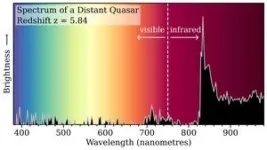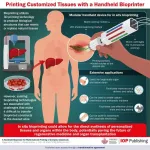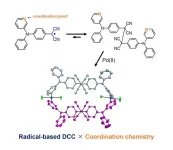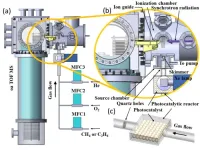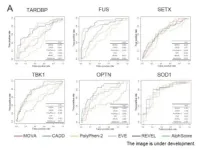(Press-News.org) A groundbreaking machine-learning study has unmasked the best drug combinations to prevent COVID-19 from coming back after an initial infection. It turns out these combos are not the same for every patient.
Using real-world data from a hospital in China, the UC Riverside-led study found that individual characteristics, including age, weight, and additional illness determine which drug combinations most effectively reduce recurrence rates. This finding has been published in the journal Frontiers in Artificial Intelligence.
That the data came from China is significant for two reasons. First, when patients are treated for COVID-19 in the U.S, it is normally with one or two drugs. Early in the pandemic, doctors in China could prescribe as many as eight different drugs, enabling analysis of more drug combinations. Second, COVID-19 patients in China must quarantine in a government-run hotel after being discharged from the hospital, which allows researchers to learn about reinfection rates in a more systematic way.
“That makes this study unique and interesting. You can’t get this kind of data anywhere else in the world,” said Xinping Cui, UCR statistics professor and study author.
The study project began in April 2020, about a month into the pandemic. At the time, most studies were focused on death rates. However, doctors in Shenzhen, near Hong Kong, were more concerned about recurrence rates because fewer people there were dying.
“Surprisingly, nearly 30% of patients became positive again within 28 days of being released from the hospital,” said Jiayu Liao, associate professor of bioengineering and study co-author.
Data for more than 400 COVID patients was included in the study. Their average age was 45, most were infected with moderate cases of the virus, and the group was evenly divided by gender. Most were treated with one of various combinations of an antiviral, an anti-inflammatory, and an immune-modulating drug, such as interferon or hydroxychloroquine.
That various demographic groups had better success with different combinations can be traced to the way the virus operates.
“COVID-19 suppresses interferon, a protein cells make to inhibit invading viruses. With defenses lowered, COVID can replicate until the immune system explodes in the body, and destroys tissues,” explained Liao.
People who had weaker immune systems prior to COVID infection required an immune-boosting drug to fight the infection effectively. Younger peoples’ immune systems become overactive with infection, which can lead to excessive tissue inflammation and even death. To prevent this, younger people require an immune suppressant as part of their treatment.
“When we get treatment for diseases, many doctors tend to offer one solution for people 18 and up. We should now reconsider age differences, as well as other disease conditions, such as diabetes and obesity,” Liao said.
Most of the time, when conducting drug efficacy tests, scientists design a clinical trial in which people having the same disease and baseline characteristics are randomly assigned to either treatment or control groups. But that approach does not consider other medical conditions that may affect how the drug works — or doesn’t work — for specific sub-groups.
Because this study utilized real-world data, the researchers had to adjust for factors that could affect the outcomes they observed. For example, if a certain drug combination was given mostly to older people and proved ineffective, it would not be clear whether the drug is to blame or the person’s age.
“For this study, we pioneered a technique to attack the challenge of confounding factors by virtually matching people with similar characteristics who were undergoing different treatment combinations,” Cui said. “In this way, we could generalize the efficacy of treatment combinations in different subgroups.”
While COVID-19 is better understood today, and vaccines have greatly reduced death rates, there remains much to be learned about treatments and preventing reinfections. “Now that recurrence is more of a concern, I hope people can use these results,” Cui said.
Machine learning has been used in many areas related to COVID, such as disease diagnosis, vaccine development and drug design, in addition to this new analysis of multi-drug combinations. Liao believes the technology will have an even bigger role to play going forward.
“In medicine, machine learning and artificial intelligence have not yet had as much impact as I believe they will in the future,” Liao said. “This project is a great example of how we can move toward truly personalized medicine.”
END
The best drug combos to prevent COVID recurrence
Better living through machine learning
2023-06-13
ELSE PRESS RELEASES FROM THIS DATE:
Bioprinting personalized tissues and organs within the body: A breakthrough in regenerative medicine
2023-06-13
In situ bioprinting, which involves 3D printing biocompatible structures and tissues directly within the body, has seen steady progress over the past few years. In a recent study, a team of researchers developed a handheld bioprinter that addresses key limitations of previous designs, i.e., the ability to print multiple materials and control the physicochemical properties of printed tissues. This device will pave the way for a wide variety of applications in regenerative medicine, drug development and testing, and custom orthotics and prosthetics.
The emergence of regenerative medicine has resulted ...
Why women with multiple sclerosis get better when pregnant
2023-06-13
Women suffering from the autoimmune disease multiple sclerosis temporarily get much better when pregnant. Researchers have now identified the beneficial changes naturally occurring in the immune system during pregnancy. The findings, published in Journal of Neuroinflammation, can show the way to new treatments.
Pregnancy is a very special condition from an immunological point of view. The immune system serves to defend us against foreign substances. However, although half of the genetic material of the foetus ...
Adhering to global health recommendations reduces cancer risk
2023-06-13
People who adhere to global Cancer Prevention Recommendations are putting themselves at lower risk of developing the disease, new research confirms.
Experts at Newcastle University have reviewed evidence of following the 2018 World Cancer Research Fund (WCRF) and American Institute for Cancer Research (AICR) lifestyle-based recommendations.
The findings, published today in Cancer, revealed that adhering to a healthier lifestyle, including maintaining a healthy body weight and eating little red meat and processed meats such as bacon, helps ...
Creation of a new molecule through innovative combination of two reactions
2023-06-13
A research group led by Professor Hideki Fujiwara and Associate Professor Daisuke Sakamaki from the Graduate School of Science at Osaka Metropolitan University succeeded, for the first time, in synthesizing a new molecule using a novel combination of dynamic covalent chemistry, in which organic radicals couple and dissociate reversibly, and coordination chemistry, which binds radicals to metal ligands. The study shows that the two types of reactions work without inhibiting each other.
“This research was based on a very simple idea of combining two types of reactions,” stated Professor Sakamaki. “However, it was not clear ...
Elevated Lipoprotein(a) is the latest variant of ‘bad cholesterol’ found to increase the risk of recurrent coronary heart disease
2023-06-13
Increased levels of Lipoprotein(a), a variant of ‘bad cholesterol’, in the bloodstream are a risk factor for recurrent coronary heart disease (CHD) in people aged 60 or over, according to the results of a new study which tracked the issue over the course of 16 years.
The results, published today in Current Medical Research & Opinion, suggest that current cholesterol-lowering medications may not be effective at reducing the risk of recurrent CHD – such as a heart attack – due to elevated Lp(a).
“This finding adds to growing evidence of a relationship between increased Lp(a) and the risk of recurrent CHD,” says lead author Associate Professor ...
USTC achieves breakthrough in in-situ detection of gas-phase active intermediates in photocatalysis
2023-06-13
Prof. PAN Yang and Associate Researcher LIU Chengyuan, researchers from the University of Science and Technology of China (USTC) of the Chinese Academy of Sciences (CAS), have achieved significant progress in detecting intermediates in methane photocatalytic reactions. Their technique, Synchronous Radiation Photoionization Mass Spectrometry (SR-PIMS), allows for in-situ detection of active intermediates. The findings were published in the prestigious chemistry journal Angewandte Chemie International ...
USTC provides comprehensive review of quantum teleportation in Nature Review Physics
2023-06-13
A team led by Academician Prof. GUO Guangcan from the Chinese Academy of Sciences (CAS) provides a comprehensive overview of the progress achieved in the field of quantum teleportation. The team, which includes Prof. HU Xiaomin, Prof. GUO Yu, Prof. LIU Biheng, and Prof. LI Chuanfeng from the University of Science and Technology of China (USTC),CAS, was invited to publish a review paper on quantum teleportation in Nature Review Physics. The paper was officially released online on May 24.
As one of the most important protocols in the field ...
USTC achieves thousand-kilometer quantum key distribution
2023-06-13
A point-to-point long-distance quantum key distribution (QKD) over a distance of 1,002 km has been achieved by scientists from the University of Science and Technology of China (USTC) of the Chinese Academy of Sciences (CAS), and their collaborators from Tsinghua University, Jinan Institute of Quantum Technology, and Shanghai Institute of Microsystem and Information Technology (SIMIT), CAS. This milestone not only sets a new world record for non-relay QKD but also provides a solution for high-speed intercity quantum communication. The ...
ASHP Summer Meeting Tip Sheet
2023-06-13
Posters
All poster presentations will take place on Monday, June 12, 2023, from 12:15 to 1:30 p.m. EDT, or Tuesday, June 13, 2023, from 12:15 to 1:30 p.m. EDT at the Baltimore Convention Center, Exhibit Hall E, Level 100.
Abstract 4-M (Monday)
Avoiding Clinical Inertia: Comparing Time to Intensification of Glucagon-like
peptide-1 (GLP-1) Receptor Agonists in Patients with Type 2 Diabetes Mellitus Among Clinical Pharmacists versus Providers
Clinical pharmacists have a significant impact on medication optimization and reduction ...
MOVA: new method for evaluating the pathogenicity of missense variants using AlphaFold2
2023-06-13
Niigata, Japan - The Department of Neurology at Niigata University has developed a new in silico method for evaluating the pathogenicity of missense variants using AlphaFold2 (MOVA). Rare variants in the causative gene of ALS are present in 10-30% of sporadic ALS cases, which highlights the need for accurate and efficient pathogenicity prediction methods. To predict the pathogenicity of the variants, in silico analysis methods are commonly used. In some ALS causal genes, the mutations are concentrated in specific regions, and the accuracy of pathogenicity prediction can be improved by considering the positional information of the variants. ...
LAST 30 PRESS RELEASES:
Start school later, sleep longer, learn better
Many nations underestimate greenhouse emissions from wastewater systems, but the lapse is fixable
The Lancet: New weight loss pill leads to greater blood sugar control and weight loss for people with diabetes than current oral GLP-1, phase 3 trial finds
Pediatric investigation study highlights two-way association between teen fitness and confidence
Researchers develop cognitive tool kit enabling early Alzheimer's detection in Mandarin Chinese
New book captures hidden toll of immigration enforcement on families
New record: Laser cuts bone deeper than before
Heart attack deaths rose between 2011 and 2022 among adults younger than age 55
Will melting glaciers slow climate change? A prevailing theory is on shaky ground
New treatment may dramatically improve survival for those with deadly brain cancer
Here we grow: chondrocytes’ behavior reveals novel targets for bone growth disorders
Leaping puddles create new rules for water physics
Scientists identify key protein that stops malaria parasite growth
Wildfire smoke linked to rise in violent assaults, new 11-year study finds
New technology could use sunlight to break down ‘forever chemicals’
Green hydrogen without forever chemicals and iridium
Billion-DKK grant for research in green transformation of the built environment
For solar power to truly provide affordable energy access, we need to deploy it better
Middle-aged men are most vulnerable to faster aging due to ‘forever chemicals’
Starving cancer: Nutrient deprivation effects on synovial sarcoma
Speaking from the heart: Study identifies key concerns of parenting with an early-onset cardiovascular condition
From the Late Bronze Age to today - Old Irish Goat carries 3,000 years of Irish history
Emerging class of antibiotics to tackle global tuberculosis crisis
Researchers create distortion-resistant energy materials to improve lithium-ion batteries
Scientists create the most detailed molecular map to date of the developing Down syndrome brain
Nutrient uptake gets to the root of roots
Aspirin not a quick fix for preventing bowel cancer
HPV vaccination provides “sustained protection” against cervical cancer
Many post-authorization studies fail to comply with public disclosure rules
GLP-1 drugs combined with healthy lifestyle habits linked with reduced cardiovascular risk among diabetes patients
[Press-News.org] The best drug combos to prevent COVID recurrenceBetter living through machine learning


